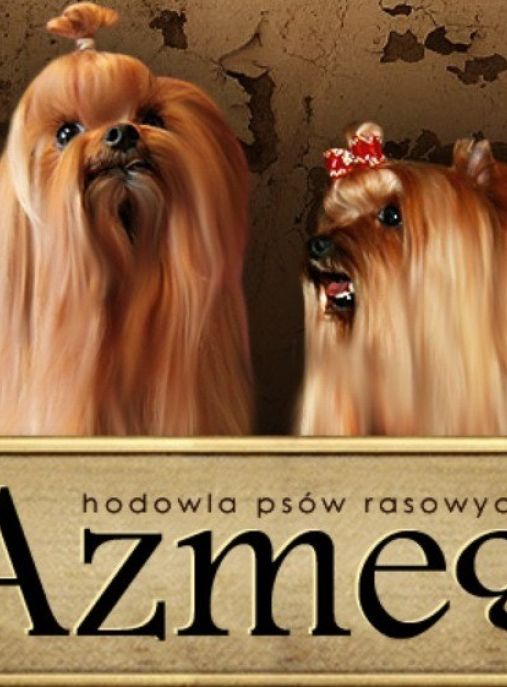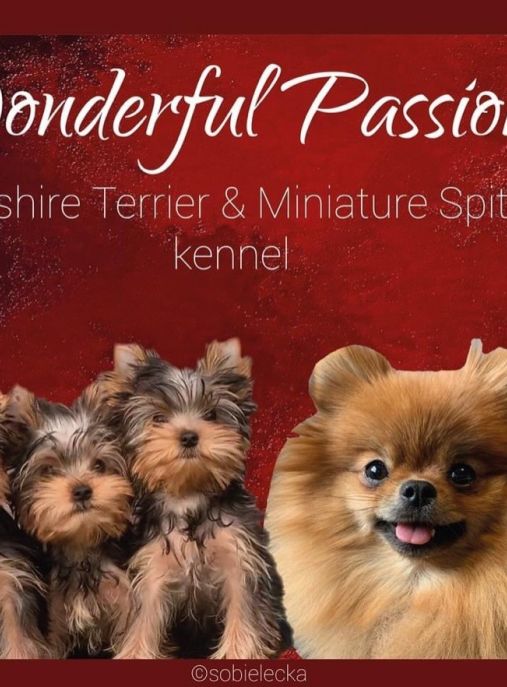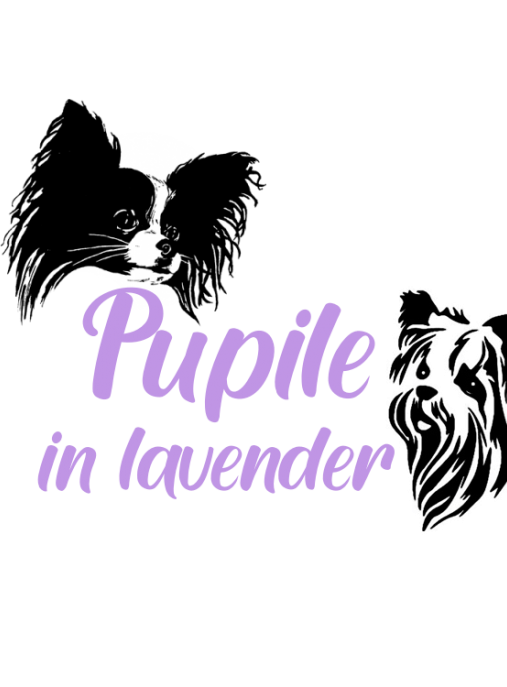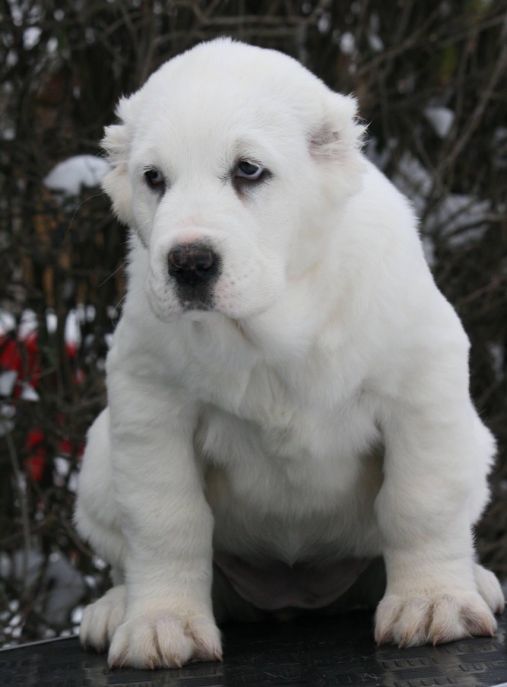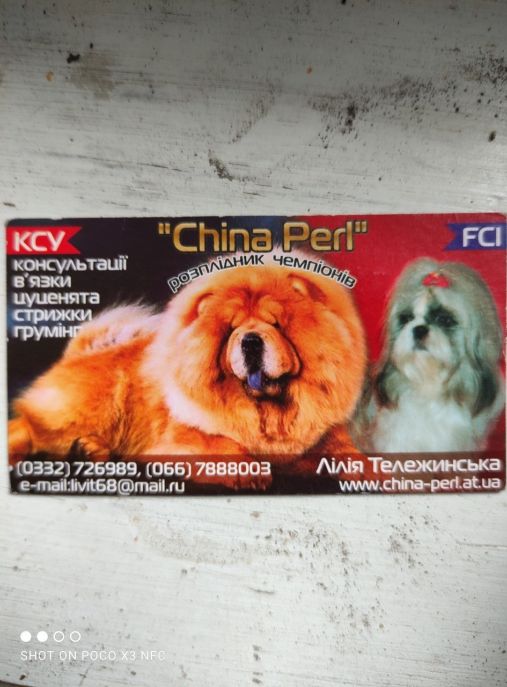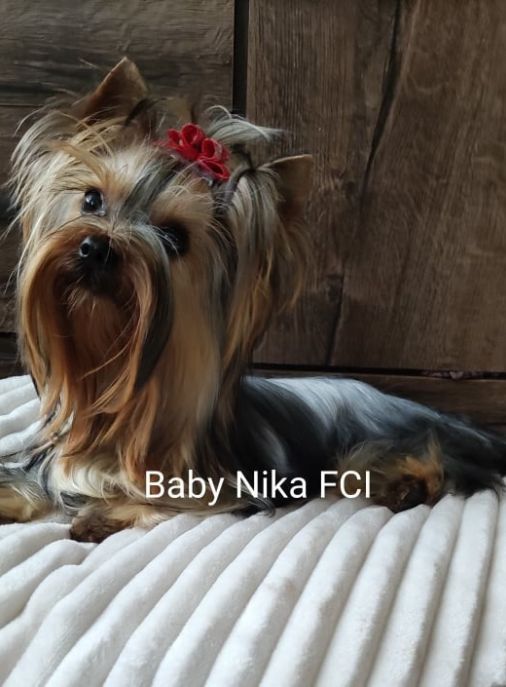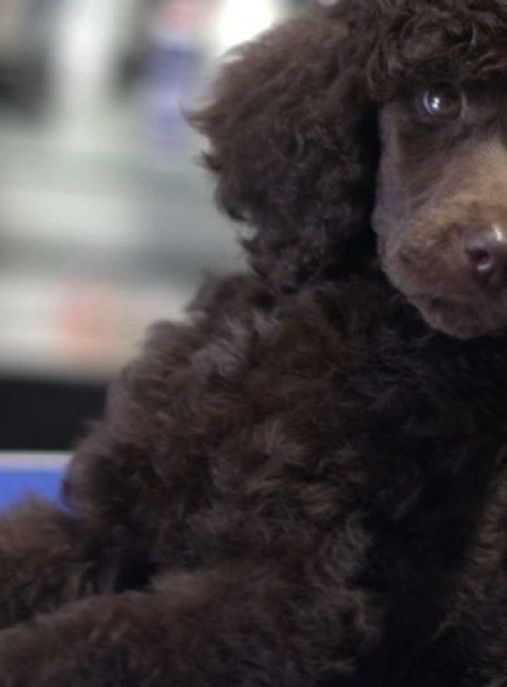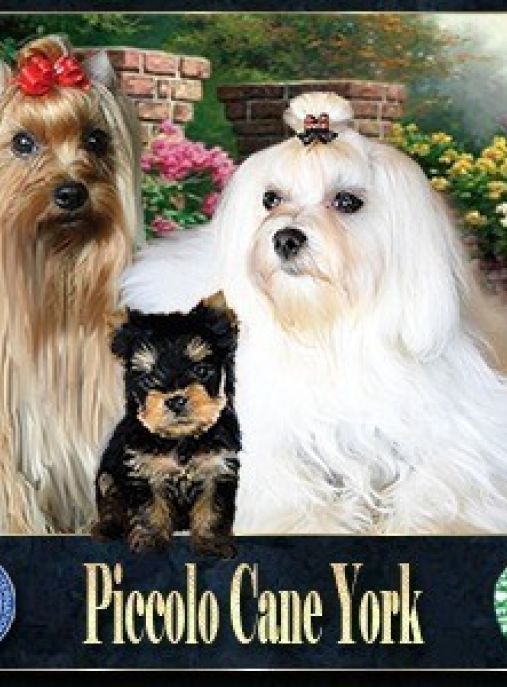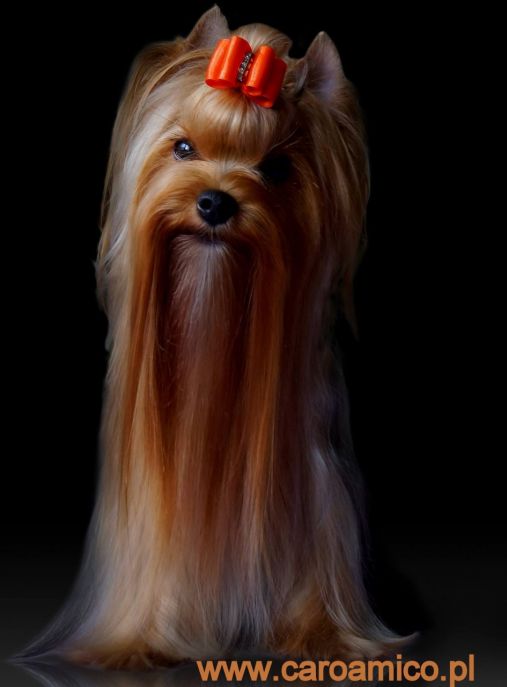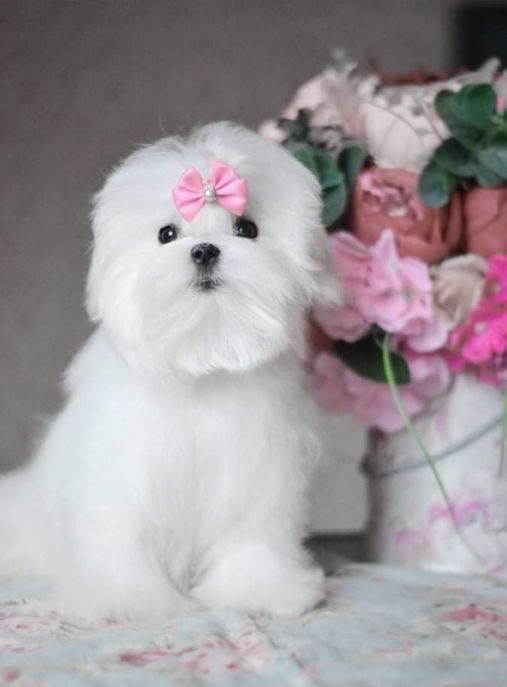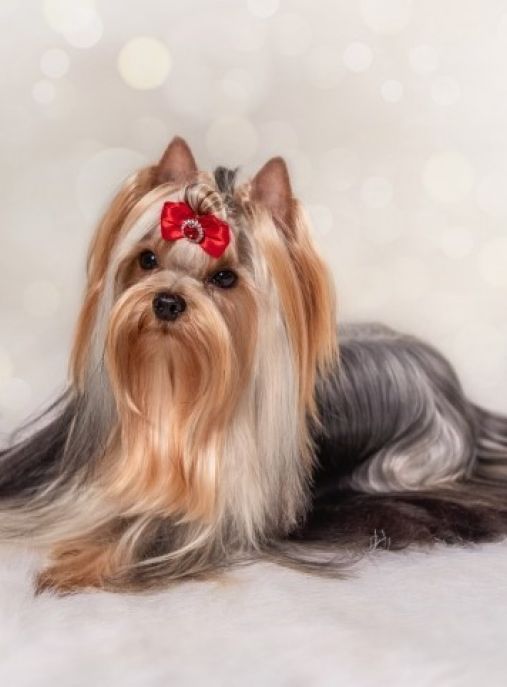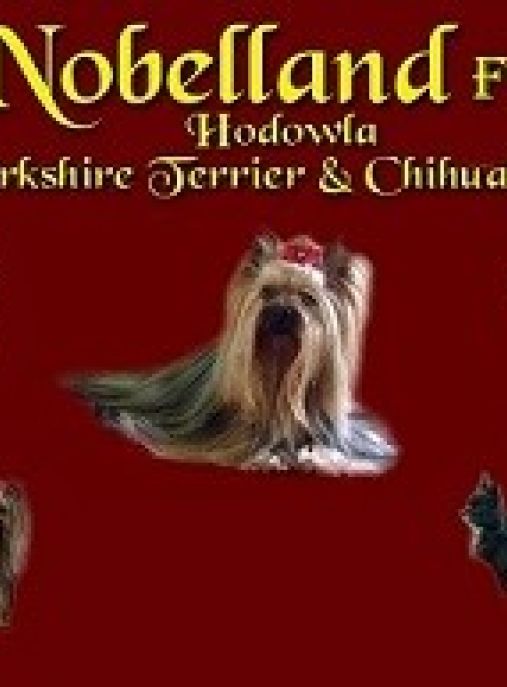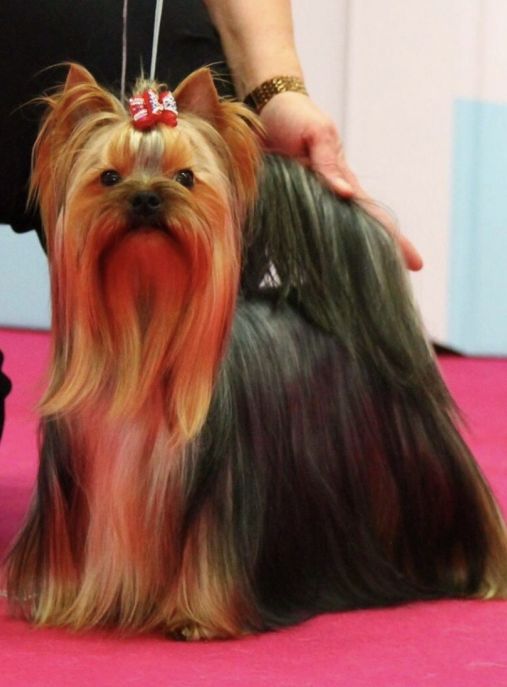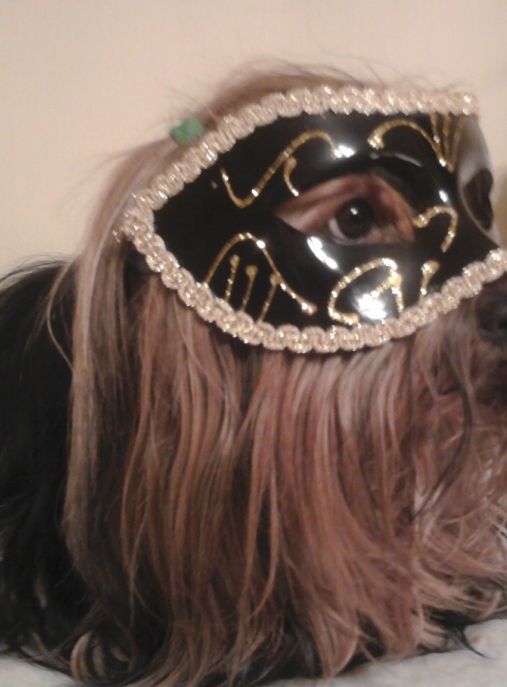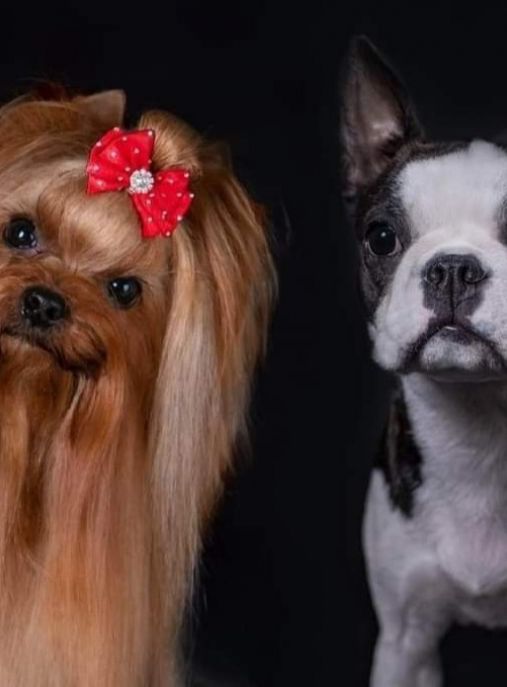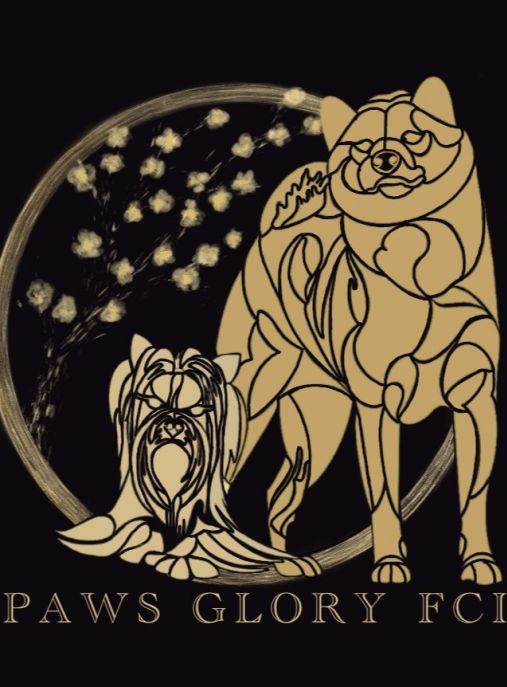The Yorkshire Terrier, often referred to as the Yorkie, is a small and elegant dog breed that captivates with its luxurious coat and confident demeanor. This breed is known for its charming personality, intelligence, and loyalty, making it a popular choice for many dog lovers around the world. With a fascinating history and a distinctive appearance, the Yorkshire Terrier has become an iconic breed in the canine world.
Originating in the mid-19th century in the county of Yorkshire, England, the Yorkshire Terrier was initially bred for the purpose of catching rats in textile mills. It is believed that the breed was developed by crossing various terrier breeds, including the Waterside Terrier, Paisley Terrier, and Skye Terrier. Over time, the breed's size was reduced, and its coat was refined to the long, silky, and glossy hair that we see today.
According to the Fédération Cynologique Internationale (FCI) typology, the Yorkshire Terrier belongs to Group 3 - Terriers. This group includes breeds that were originally bred for hunting and vermin control. Despite its diminutive size, the Yorkie possesses the tenacity and determination of its terrier ancestors, which is evident in its spirited nature.
Yorkshire Terriers are primarily companion dogs and are well-suited for individuals and families alike. Their small size makes them adaptable to various living situations, including apartments, as long as they receive regular exercise and mental stimulation. Due to their affectionate and loyal nature, Yorkies thrive in close human companionship and enjoy being the center of attention.
In terms of physical characteristics, the Yorkshire Terrier is a toy-sized breed, with an average weight ranging from 4 to 7 pounds (1.8 to 3.2 kilograms). They stand at a height of around 8 to 9 inches (20 to 23 centimeters) at the shoulder. Despite their small stature, Yorkies possess a confident and self-assured demeanor, often compensating for their size with a bold and fearless attitude.
One of the most distinctive features of the Yorkshire Terrier is its long, flowing coat. The hair is fine, silky, and glossy, often reaching the ground when fully grown. The coat is typically a combination of steel blue and tan, with the blue color dominating the body and the tan appearing on the head, chest, and legs. Regular grooming is essential to maintain the coat's beauty and prevent matting.
In terms of lifespan, Yorkshire Terriers generally live between 12 to 15 years, although some individuals have been known to live even longer with proper care. It is important to note that Yorkies may be prone to certain health issues, including dental problems, patellar luxation, and tracheal collapse. Regular veterinary check-ups, a balanced diet, and exercise can help mitigate these risks and ensure a long and healthy life for your furry companion.
Despite their small size, Yorkshire Terriers are known for their intelligence and trainability. They excel in various dog sports, such as obedience, agility, and even therapy work. However, it is important to provide consistent and positive reinforcement-based training methods to bring out the best in these intelligent dogs.
In conclusion, the Yorkshire Terrier is a delightful breed that combines elegance, intelligence, and a loving nature. With their striking appearance and charming personality, Yorkies have become beloved companions for many dog enthusiasts. Whether you are looking for a loyal and affectionate companion or a small dog with a big personality, the Yorkshire Terrier is sure to capture your heart.
The Yorkshire Terrier, often referred to as the Yorkie, is a small breed of dog that possesses a character as unique as its appearance. Despite their small size, Yorkshire Terriers are known for their big personalities and unwavering loyalty. These delightful dogs have a distinct character that sets them apart from other breeds.
One of the most prominent traits of Yorkshire Terriers is their confidence. They are bold and fearless, often unaware of their small stature. This confidence makes them excellent watchdogs, as they are always alert and ready to protect their loved ones. Despite their protective nature, Yorkies are also incredibly affectionate and thrive on human companionship. They form strong bonds with their owners and are known to be quite clingy, always wanting to be by their side.
Yorkshire Terriers are intelligent dogs and possess a keen sense of curiosity. They are quick learners and enjoy mental stimulation. This makes them highly trainable, although they can be stubborn at times. Consistency and positive reinforcement are key when training a Yorkie, as they respond best to rewards and praise. Early socialization is also crucial to prevent them from becoming overly protective or anxious around strangers.
While Yorkies are generally friendly, they can be wary of unfamiliar people or animals. They may exhibit a territorial nature and can be vocal when they sense a threat. This tendency to bark excessively can be managed through proper training and socialization. It is important to note that Yorkies are not suitable for households with small children, as their delicate size makes them vulnerable to accidental injury.
Despite their small size, Yorkshire Terriers have a surprisingly high energy level. They require regular exercise to keep them physically and mentally stimulated. Daily walks, playtime, and interactive toys are essential to prevent them from becoming bored or developing destructive behaviors. However, it is important to avoid overexertion, as their tiny frames are prone to injury.
Grooming is another important aspect of caring for a Yorkshire Terrier. Their long, silky coats require regular brushing to prevent matting and tangling. Many owners choose to keep their Yorkies' coats trimmed short for easier maintenance. Additionally, regular dental care is crucial, as Yorkies are prone to dental issues. Brushing their teeth regularly and providing appropriate chew toys can help maintain their oral health.
In conclusion, Yorkshire Terriers are charismatic and affectionate dogs with a unique character. Their confidence, intelligence, and loyalty make them wonderful companions. However, they require proper training, socialization, and exercise to thrive. With the right care and attention, a Yorkshire Terrier can bring immense joy and love to any household.
The Yorkshire Terrier, also known as the Yorkie, is a small and adorable breed that requires specific care to ensure their well-being. Here is an extensive description of the recommended care for Yorkshire Terrier dogs, including tips on what to do and what not to do:
1. Grooming: Yorkshire Terriers have long, silky hair that requires regular grooming. Brush their coat daily to prevent tangles and mats. Regular bathing is essential, but be cautious not to overdo it as it can dry out their skin. Trim their nails regularly and clean their ears to prevent infections.
2. Exercise: Despite their small size, Yorkies are energetic dogs that need regular exercise. Take them for daily walks or play sessions to keep them physically and mentally stimulated. However, be mindful not to overexert them, especially in extreme weather conditions, as they are prone to heatstroke.
3. Dental Care: Yorkies are prone to dental issues, so it's crucial to establish a dental care routine. Brush their teeth regularly with a dog-specific toothpaste and provide dental chews or toys to promote oral health. Regular dental check-ups with a veterinarian are also recommended.
4. Feeding: Provide a balanced and nutritious diet suitable for small breed dogs. Yorkies have delicate digestive systems, so opt for high-quality dog food that is easily digestible. Avoid overfeeding, as Yorkies are prone to obesity, which can lead to various health problems.
5. Socialization: Yorkshire Terriers can be wary of strangers and other animals if not properly socialized. Expose them to different people, animals, and environments from a young age to ensure they grow up to be well-rounded and friendly dogs. Enroll them in puppy socialization classes to aid in their social development.
6. Training: Yorkies are intelligent dogs that respond well to positive reinforcement training methods. Start training early to establish good behavior and basic commands. Be patient and consistent, and avoid harsh training techniques as they can be counterproductive.
7. Health Care: Regular veterinary check-ups are essential to monitor your Yorkie's overall health. Vaccinations, parasite prevention, and routine examinations are crucial to prevent diseases and catch any health issues early on. Yorkies are prone to certain genetic conditions, such as patellar luxation and dental problems, so be vigilant and seek prompt veterinary care if any concerns arise.
8. Safety: Yorkies are small and fragile, so it's important to create a safe environment for them. Secure your home and yard to prevent escapes or accidents. Be cautious when handling them, especially around children, as rough play can lead to injuries. Keep harmful substances, small objects, and toxic plants out of their reach.
What not to do:
1. Do not leave your Yorkie alone for extended periods as they thrive on companionship and can develop separation anxiety.
2. Avoid exposing your Yorkie to extreme temperatures, as they are sensitive to both heat and cold.
3. Do not skip regular grooming sessions, as neglecting their coat can lead to painful matting and skin issues.
4. Avoid feeding your Yorkie table scraps or unhealthy treats, as it can lead to obesity and digestive problems.
5. Do not use harsh training methods or punishment, as it can damage their trust and hinder their learning process.
6. Avoid overexerting your Yorkie during exercise, as their small size makes them prone to injuries.
7. Do not neglect their dental care, as poor oral hygiene can lead to dental diseases and discomfort.
By following these tips and providing the recommended care, you can ensure that your Yorkshire Terrier leads a happy, healthy, and fulfilling life.
The Yorkshire Terrier, often referred to as the Yorkie, is a small and elegant breed known for its luxurious coat. When it comes to their color, Yorkshire Terriers have a distinct and unique appearance that sets them apart from other breeds. The common color of Yorkshire Terrier dogs is a combination of rich, deep blue and golden tan.
The blue color in Yorkshire Terriers is often described as a steel blue or dark gray hue. This shade is most prominent on the body and head of the dog. The blue coloration starts from the back of the neck and extends down the back, gradually fading into a lighter shade towards the tail. The head is typically a darker blue, giving the Yorkie a regal and sophisticated look.
Complementing the blue color is the golden tan, which is seen on specific areas of the dog's body. The tan color is most noticeable on the face, chest, legs, and the underside of the tail. It forms a sharp contrast against the blue, creating a striking and eye-catching appearance. The tan color is often described as a rich, warm shade, resembling the color of a well-baked biscuit or a golden sunset.
The distribution of the tan color on a Yorkshire Terrier's face is quite distinctive. It typically forms a mask-like pattern, covering the muzzle and extending up to the eyes. This mask is often referred to as the "saddle" due to its shape, which resembles a horse's saddle. The tan color also appears on the ears, giving them a beautiful and elegant look.
In addition to the blue and tan, Yorkshire Terriers may also have some black accents on their coat. These black hairs are usually found on the back, head, and ears, adding depth and dimension to their overall appearance. The black hairs are often interspersed with the blue and tan, creating a harmonious blend of colors.
It is important to note that the color of a Yorkshire Terrier's coat can vary slightly from dog to dog. Some Yorkies may have a lighter or darker shade of blue, while others may have a more pronounced tan color. However, the combination of blue and golden tan is the most common and recognized color pattern for this breed.
The color of a Yorkshire Terrier's coat is not only visually appealing but also serves as a reflection of their breed standard. It is a testament to their elegance, grace, and regal nature. Whether they are strutting down the street or sitting on their owner's lap, Yorkshire Terriers are sure to turn heads with their stunning blue and golden tan coat.
The Yorkshire Terrier, or Yorkie, is a small and adorable breed known for its long, silky coat and lively personality. While they may be pint-sized, they are prone to certain health issues that owners should be aware of. Proper care and attention can help ensure the well-being of these beloved companions.
One of the most common health concerns in Yorkshire Terriers is dental problems. Due to their small mouths and crowded teeth, Yorkies are prone to dental issues such as tooth decay, gum disease, and tooth loss. Regular dental care, including brushing their teeth with a dog-friendly toothpaste and providing dental chews or toys, can help maintain good oral hygiene.
Another prevalent health issue in Yorkies is patellar luxation, a condition where the kneecap slips out of place. This can cause pain, lameness, and difficulty in walking. Regular exercise, maintaining a healthy weight, and avoiding excessive jumping or rough play can help prevent this condition. In severe cases, surgical intervention may be required.
Yorkshire Terriers are also susceptible to tracheal collapse, a condition where the windpipe weakens and narrows, leading to coughing, wheezing, and difficulty breathing. To minimize the risk, it is important to use a harness instead of a collar when walking your Yorkie, as collars can put pressure on the trachea. Avoid exposing them to irritants such as smoke or strong chemicals that can worsen respiratory symptoms.
Additionally, Yorkies are prone to eye problems, including cataracts, dry eye, and progressive retinal atrophy. Regular eye examinations by a veterinarian can help detect any issues early on. Keeping their eyes clean and free from discharge, avoiding excessive exposure to sunlight, and providing a balanced diet rich in antioxidants can help maintain good eye health.
Yorkshire Terriers are also known to have sensitive digestive systems. They may experience food allergies or intolerances, leading to gastrointestinal issues such as diarrhea or vomiting. Feeding them a high-quality, easily digestible diet and avoiding table scraps or sudden changes in their food can help prevent digestive upsets.
To ensure the overall health of your Yorkshire Terrier, regular veterinary check-ups are essential. Vaccinations, parasite prevention, and routine blood tests can help detect any underlying health conditions. Grooming is also crucial for Yorkies, as their long, silky coats require regular brushing to prevent matting and skin issues.
In conclusion, while Yorkshire Terriers are generally healthy dogs, they are prone to certain health conditions. Dental problems, patellar luxation, tracheal collapse, eye issues, and sensitive digestion are some of the common health concerns in this breed. By providing proper dental care, exercise, using a harness, regular eye examinations, and feeding a balanced diet, owners can help maintain the health and well-being of their beloved Yorkies. Regular veterinary check-ups and grooming are also vital to ensure a long and happy life for these delightful companions.
The Yorkshire Terrier, also known as the Yorkie, is a small and adorable breed that requires proper nutrition to maintain its health and well-being. Providing a balanced diet is essential for these dogs to thrive and prevent potential health issues. In this text, we will explore the nutritional needs of Yorkshire Terriers, offer advice on feeding them, and highlight foods to avoid.
Yorkshire Terriers are energetic and lively dogs, despite their small size. They have a fast metabolism, which means they require a nutrient-dense diet to fuel their energy levels. A well-balanced diet for a Yorkie should consist of high-quality proteins, healthy fats, and a moderate amount of carbohydrates.
Protein is crucial for muscle development and repair, and it should make up a significant portion of a Yorkie's diet. Good sources of protein for Yorkies include lean meats like chicken, turkey, and fish. These meats should be cooked thoroughly to eliminate any potential bacteria or parasites. Additionally, eggs and dairy products like cottage cheese or plain yogurt can also be included in their diet.
Healthy fats are essential for Yorkies as they provide energy and support their skin and coat health. Incorporating omega-3 fatty acids into their diet can help maintain a shiny and healthy coat. Fish oil or flaxseed oil supplements are excellent sources of omega-3 fatty acids and can be added to their food.
Carbohydrates should be included in moderate amounts in a Yorkie's diet. Opt for complex carbohydrates like whole grains, sweet potatoes, and brown rice. These provide a steady release of energy and are more beneficial than simple carbohydrates found in processed foods.
Feeding a Yorkie should be done in small, frequent meals throughout the day. Their small stomachs cannot handle large meals, so dividing their daily food intake into three to four smaller portions is recommended. Free-feeding, where food is available all day, should be avoided as it can lead to overeating and obesity.
When it comes to treats, choose healthy options that are specifically designed for small breeds. Avoid giving them table scraps or high-calorie treats, as this can lead to weight gain and digestive issues. Treats should only make up a small portion of their daily calorie intake.
While it is important to know what to feed a Yorkshire Terrier, it is equally crucial to be aware of foods that should be avoided. Some human foods can be toxic to dogs and should never be given to them. These include chocolate, grapes, raisins, onions, garlic, caffeine, alcohol, and anything containing xylitol, an artificial sweetener.
Additionally, Yorkies are prone to dental issues, so it is essential to promote good oral hygiene. Feeding them dry kibble or incorporating dental chews can help keep their teeth clean and prevent dental diseases.
In conclusion, providing a well-balanced and nutritious diet is vital for the health and happiness of Yorkshire Terriers. High-quality proteins, healthy fats, and moderate amounts of carbohydrates should be the foundation of their diet. Feeding them small, frequent meals and avoiding harmful foods will help ensure their overall well-being. Remember, consulting with a veterinarian is always recommended to tailor the diet to your specific Yorkie's needs.
